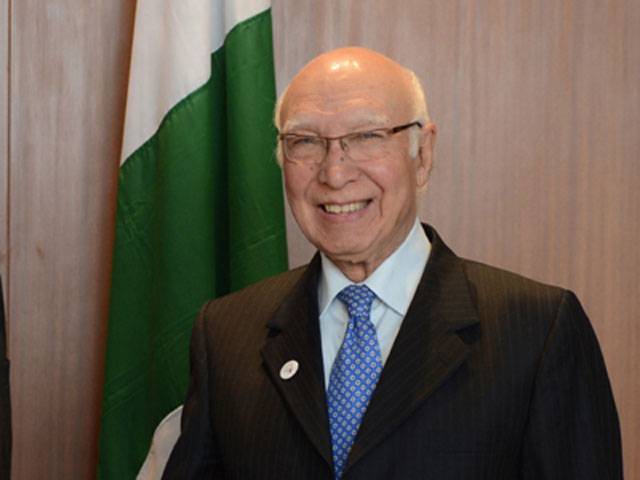ISLAMABAD - Pakistan on Tuesday warned that operationalisation of nuclear deal between the US and India for political and economic expediencies would have a detrimental impact on deterrence stability in South Asia.
Reacting to the statements made and agreements signed during US President Barack Obama’s visit to India, PM’s Adviser on Foreign Affairs Sartaj Aziz said Pakistan reserves the right to safeguard its national security interests.
“We have taken a careful note of the statements made and agreements reached between the United States and India on issues having a global and regional impact during Obama’s visit to India,” Sartaj said in a statement, adding that Pakistan is examining the longer term implications of these agreements for its security.
He said Pakistan supports a reformed UN Security Council that corresponds to the positions and collective interests of all member states, not just a few.
He pointed out that Pakistan along with majority of UN member states favours a comprehensive reform of the Security Council to make this principal organ of the United Nations – more representative, democratic, effective, transparent and accountable.
“Proposals to add new centres of privilege in the Security Council run counter to these collective objectives of Security Council reform; and have no rationale in this age of democracy, inclusiveness and accountability,” he said.
Sartaj noted that a country violating UN Security Council resolutions on matters of international peace and security such as the Jammu and Kashmir dispute, by no means qualifies for a special status in the Security Council.
Aziz also noted with concern the joint statement that suggested India was ready for NSG (Nuclear Suppliers Group) membership and other export control regimes.
“Pakistan is opposed to yet another country-specific exemption from NSG rules to grant membership to India,” the adviser said arguing this would further compound the already fragile strategic stability environment in South Asia, further undermine the credibility of NSG and weaken the non-proliferation regime.
He said Pakistan remains opposed to policies of selectivity and discrimination. Pakistan is not averse to civil nuclear cooperation and NSG membership for non-NPT states provided it is based on the principles of non-discrimination and objective non-proliferation criteria.
“Pakistan would continue to maintain its constructive engagement with NSG and other export control regimes to build its case for membership,” he added.
Aziz said cooperative and collective actions by all member states are required to effectively tackle the global threat of terrorism. Pakistan is a leading partner of the international community in counter-terrorism.
“We also expect the same commitment from others. Pakistan is also the biggest victim of terrorism, including that sponsored and supported from abroad. Pakistan’s contribution and sacrifices in the fight against terrorism have been widely acknowledged,” he added.
He rejected any insinuation or aspersion over Pakistan’s commitment to fight terrorism. He was of the view that condemnation of terrorism in all its forms and manifestations should not be based on selectivity or double standards, and reiterated Pakistan’s call on India to bring the planners and perpetrators of the February 2007 Samjhota Express terrorist attack to justice.
The adviser said Pakistan values its relations with the United States and expects it to play a constructive role for strategic stability and balance in South Asia.
AFP adds: The US and India reached an agreement Sunday during Obama’s visit to New Delhi, breaking the deadlock that has stalled a civilian nuclear power agreement for years.
The US and India in 2008 signed a landmark deal giving India access to civilian nuclear technology, but it had been held up since by US concerns over India’s strict laws on liability in the event of a nuclear accident.
Pakistan and India have fought two wars over Kashmir, which both countries administer in part.
Recent exchanges of fire across the de facto border, known as the Line of Control (LoC) have killed more than two dozen civilians and forced thousands to flee their homes on both sides.
Pakistan and India traded blame for the upsurge in firing and shelling which started on October 6 last year.
Sunday, May 26, 2024
US-India N-deal to cause deterrence instability
| Pakistan warns against exempting India from NSG rules

PM Shehbaz, PPP delegation discuss political situation
10:53 AM | May 26, 2024
Princess Zahra arrives in Chitral
May 26, 2024
RMC hosts 6th national research conference
May 26, 2024
KP budget jugglery of words: Muqam
May 26, 2024
Taiwan Escalation
May 26, 2024
Salaries & Pensions
May 26, 2024
Controlling Mobs
May 26, 2024
An Effective Registry
May 25, 2024
Economic Respite
May 25, 2024
History’s Biggest Fraud
May 26, 2024
Self-Medication
May 26, 2024
A Call for Reform
May 26, 2024
Natural Resources in Balochistan
May 25, 2024
Tribal Disputes
May 25, 2024
ePaper - Nawaiwaqt
Advertisement
Nawaiwaqt Group | Copyright © 2024





